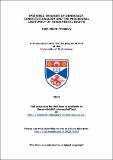Files in this item
Epistemic theories of democracy, constitutionalism and the procedural legitimacy of fundamental rights
Item metadata
| dc.contributor.advisor | Cruft, Rowan | |
| dc.contributor.advisor | Mulgan, Tim | |
| dc.contributor.author | Allard-Tremblay, Yann | |
| dc.coverage.spatial | viii, 172 | en_US |
| dc.date.accessioned | 2013-04-04T10:44:56Z | |
| dc.date.available | 2013-04-04T10:44:56Z | |
| dc.date.issued | 2012-11-30 | |
| dc.identifier.uri | https://hdl.handle.net/10023/3465 | |
| dc.description.abstract | The overall aim of this thesis is to assess the legitimacy of constitutional laws and bills of rights within the framework of procedural epistemic democracy. The thesis is divided into three sections. In the first section, I discuss the relevance of an epistemic argument for democracy under the circumstances of politics: I provide an account of reasonable disagreement and explain how usual approaches to the authority of decision-making procedures fail to take it seriously. In the second part of the thesis, I provide an account of the epistemic features of democracy and of the requirements of democratic legitimacy. I develop a revised pragmatist argument for democracy which relies on three presumptive aims of decision-making: justice, sustainability and concord. In the third and last section, I first argue for the desirability of constitutionalism. I then explain why constitutionalism, as it is usually understood, is incompatible with my procedural epistemic account of democratic legitimacy. In the last chapter, I offer a two-pronged solution to the apparent incompatibility of constitutionalism and epistemic democracy. I first argue for the appropriateness of political constitutionalism, as opposed to legal constitutionalism, in understanding the relationship between rights and democracy. I then provide an account of rights protection and judicial review compatible with epistemic democratic legitimacy. Finally, I use the notion of pragmatic encroachment to explain how constitutional laws can achieve normative supremacy through the increased epistemic credentials of the procedure. | en_US |
| dc.language.iso | en | en_US |
| dc.publisher | University of St Andrews | |
| dc.subject | Epistemic democracy | en_US |
| dc.subject | Constitutionalism | en_US |
| dc.subject | Legitimacy | en_US |
| dc.subject | Rights | en_US |
| dc.subject.lcc | JC423.A66 | |
| dc.subject.lcsh | Democracy--Philosophy | en_US |
| dc.subject.lcsh | Epistemics | en_US |
| dc.subject.lcsh | Constitutional law--Philosophy | en_US |
| dc.subject.lcsh | Legitimacy of governments--Philosophy | en_US |
| dc.title | Epistemic theories of democracy, constitutionalism and the procedural legitimacy of fundamental rights | en_US |
| dc.type | Thesis | en_US |
| dc.contributor.sponsor | Fonds Québécois de Recherche sur la Société et la Culture | en_US |
| dc.contributor.sponsor | St Andrews and Stirling Graduate Programme in Philosophy (SASP) | en_US |
| dc.type.qualificationlevel | Doctoral | en_US |
| dc.type.qualificationname | PhD Doctor of Philosophy | en_US |
| dc.publisher.institution | The University of St Andrews | en_US |
| dc.publisher.department | The University of Stirling | en_US |
| dc.rights.embargodate | 2022-11-12 | en_US |
| dc.rights.embargoreason | Thesis restricted in accordance with University regulations. Electronic copy of sections 6.1.3, 7.1.4, 7.1.5 and 7.1.6 restricted until 12th November 2022 | en_US |
This item appears in the following Collection(s)
Items in the St Andrews Research Repository are protected by copyright, with all rights reserved, unless otherwise indicated.

